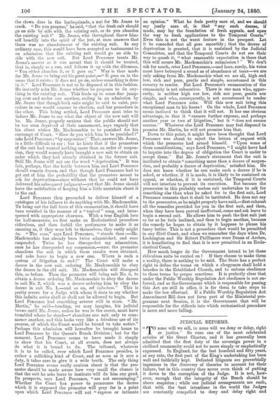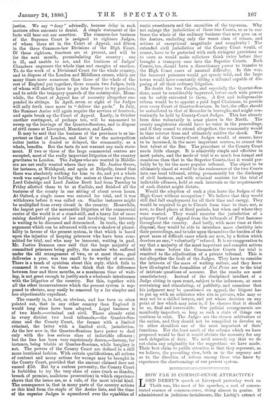JUDICIAL REFORMS. " T . none will we sell, to none
will we deny or delay, right justice. We say " deny" advisedly, because delay in such matters often amounts to denial. A simple statement of the facts will bear out our assertion. The common-law business of the Supreme Court is assigned to eighteen Judges, of whom three sit in the Court of Appeal, and fifteen in the three Common-law Divisions of the High Court. Of these eighteen, fourteen are at present, and will be for the next month, perambulating the country ; one is ill, and unable to act, and the business of Judges' Chambers engrosses the whole time and energies of another. To do the work of a Divisional Court for the whole country, and to dispose of the London and Middlesex causes, which are many times more numerous than those of the whole of the rest of England put together, there remain two Judges, both of whom will shortly have to go into Surrey to try poachers, and to settle the trumpery quarrels of the country-side. Mean- while, the Court of Appeal has of necessity altogether sus- pended its sittings. In April, seven or eight of the Judges will sally forth once more to " deliver the gaols." In July, the Summer Assize will again require the services of fourteen, and again break up the Court of Appeal. Lastly, in October another contingent, of perhaps ten, will be summoned to sweep up the leavings of the Quarter-Sessions, and to dispose of civil causes at Liverpool, Manchester, and Leeds.
It may be said that the business of the provinces is as im- portant as that of London, and that if to the metropolitan suitor justice is denied or delayed, the community, as a whole, benefits. But the facts do not warrant any such state- ment. If two or three of the large commercial centres are excepted, most of the really important litigation of the country gravitates to London. The Judges who are wanted in Middle- sex are not really wanted where they are. Mr. Justice Grove, for instance, at Welshpool, and again at Dolgelly, found that there was absolutely nothing for him to do, and yet a whole week was assigned for holding the assizes at these two places. Lord Coleridge and Lord Justice Brett had from Tuesday to Friday allotted them to be at Carlisle, and finished all the business of the county in one sitting of about seven hours. At Oxford, a single cause was entered for trial, and it was withdrawn before it was called on. Similar instances might be multiplied from every circuit in the country. Meanwhile, the largest part of the mercantile litigation of the commercial centre of the world is at a stand-still, and a heavy list of cases raising doubtful points of law and involving vast interests is 'waiting to be discussed and determined. In truth, the only argument which can be advanced with even a shadow of plausi- bility in favour of the present system, is that which is based upon the injustice of keeping prisoners who have been com- mitted for trial, and who may be innocent, waiting in gaol. Mr. Justice Denman once said that the large majority of committed prisoners being guilty, the number who suffered under the old arrangement of two, or at most three, gaol deliveries a year, was too small to be worthy of account. There is a touch of cynicism about this reply, which fails to commend it even to those who think that the difference between four and three months, as a maximum time of wait- ing, is not great enough to justify such a wholesale interference with the litigation of the country. But this, together with all the other inconveniences which the present system is sup- posed to obviate, may easily be removed by a far simpler and less objectionable expedient.
The remedy is, in fact, so obvious, and has been so often pointed out, that in any other country than England it would long since have been adopted. Legal business is of two kinds,—criminal and civil. There already exist in every district two local tribunals,—the Quarter-Ses- sions and the County Court, the former with a limited criminal, the latter with a limited civil, jurisdiction. As the law now is, the Quarter-Sessions have power to deal only with the less serious class of indictable offences ; but the line has been very capriciously drawn,—larceny, for instance, being triable at Quarter-Sessions, while burglary is not. The powers of the_County Court are defined in a still more irrational fashion. With certain qualifications, all actions of contract and many actions for wrongs may be brought in the County Court, provided that the amount claimed does not exceed £50. But by a curious perversity, the County Court is forbidden to try the very class of cases (such as slander, breach of promise, malicious prosecution) in which experience shows that the issues are, as a rule, of the most trivial kind. The consequence is, that in many parts of the country actions or this kind form the staple of the Assize lists, and the time of the superior Judges is squandered over the squabbles of rustic sweethearts and the amenities of the tap-room. Why not enlarge the jurisdiction of these two Courts, so as to em- brace the whole of the ordinary business that now goes on at the Assizes, excluding only the worst class of crimes, and actions of exceptional magnitude and complexity ? The extended civil jurisdiction of the County Court would, of course, have to be protected with such stringent provisions as to costs as would make solicitors think twice before they brought a trumpery case into the Superior Courts. Both Courts, too, should have a discretionary power to transfer to the High Court cases of unusual difficulty. In this way, the innocent prisoners would get speedy trial, and the large towns would have constantly sitting a tribunal capable of dis- posing of all their ordinary litigation. No doubt the two Courts, and especially the Quarter-Ses- sions, must be considerably improved, before such wide powers can be safely entrusted to them. A first and indispensable reform would be to appoint a paid legal Chairman, to preside over every Court of Quarter-Sessions. In fact, the office should be assimilated to that of Recorder in boroughs, and might con- veniently be held by County-Court Judges. This has already been done voluntarily in some places in the North. The county magistrates should have no voice in the proceedings, and if they ceased to attend altogether, the community would in time recover from and ultimately outlive the shock. The salaries of the County-Court Judges would, of course, have to be increased, in the more important centres, to attract the best talent of the Bar. The procedure of the County Court needs little change. It is admirably simple and effective in most points, and the mode of trial is so much less formal and cumbrous than that in the Superior Courts, that it would pro- bably be by far the more popular tribunal. The object to be ultimately aimed at would be the coalescence of the two Courts into one local tribunal, sitting permanently for the discharge of civil business, and with criminal sessions for the trial of indictable offences, held at such intervals as the requirements of each district might dictate.
Would the adoption of such a plan leave the Judges of the High Court without occupation ? We believe that they would still find full employment for all their time and energy. They would be required to go to Circuit from time to time, not, as now, to fixed places at fixed periods, but when and where they were wanted. They would exercise the jurisdiction of a primary Court of Appeal from the tribunals of First Instance throughout the country. And lastly, with more time at their disposal, they would be able to introduce more elasticity into their proceedings, and to take upon themselves the burden of the great mass of difficult cases which are now, by a fiction which deceives no one, " voluntarily" refused. It is no exaggeration to say that a majority of the most important and complex actions which come before the Common-law Courts for trial is remitted to the adjudication of a private tribunal. This is not altogether the fault of the Judges. They have to consider the interests of the mass of waiting suitors, and they know how ill-adapted the formalities of Nisi Prim are to the trial of intricate questions of account. But the results are most unsatisfactory. Instead of the disciplined intellect of a Judge sitting in open court, subject to the influences, at once restraining and stimulating, of publicity, and conscious that his judgment may be questioned on appeal, the litigant has to put up with an arbitrator who sits in private, who may or may not be a skilled lawyer, and yet whose decision on any point of law which may arise is, if he chooses that it should be so, final and irreversible. Our judicial arrangements are manifestly imperfect, so long as such a state of things can continue to exist. The Judges are the chosen arbitrators of the nation, and they should not be compelled to devolve on to other shoulders one of the most important of their- functions. Not the least merit of the scheme which we have proposed would be that it would obviate the necessity for any such delegation of duty. We need scarcely say that we do not claim any originality for the suggestions we have made. Their best claim to public attention is that they represent, as we believe, the prevailing view, both as to the urgency and as to the direction of reform among those who know by experience the shortcomings of our present system.



































 Previous page
Previous page